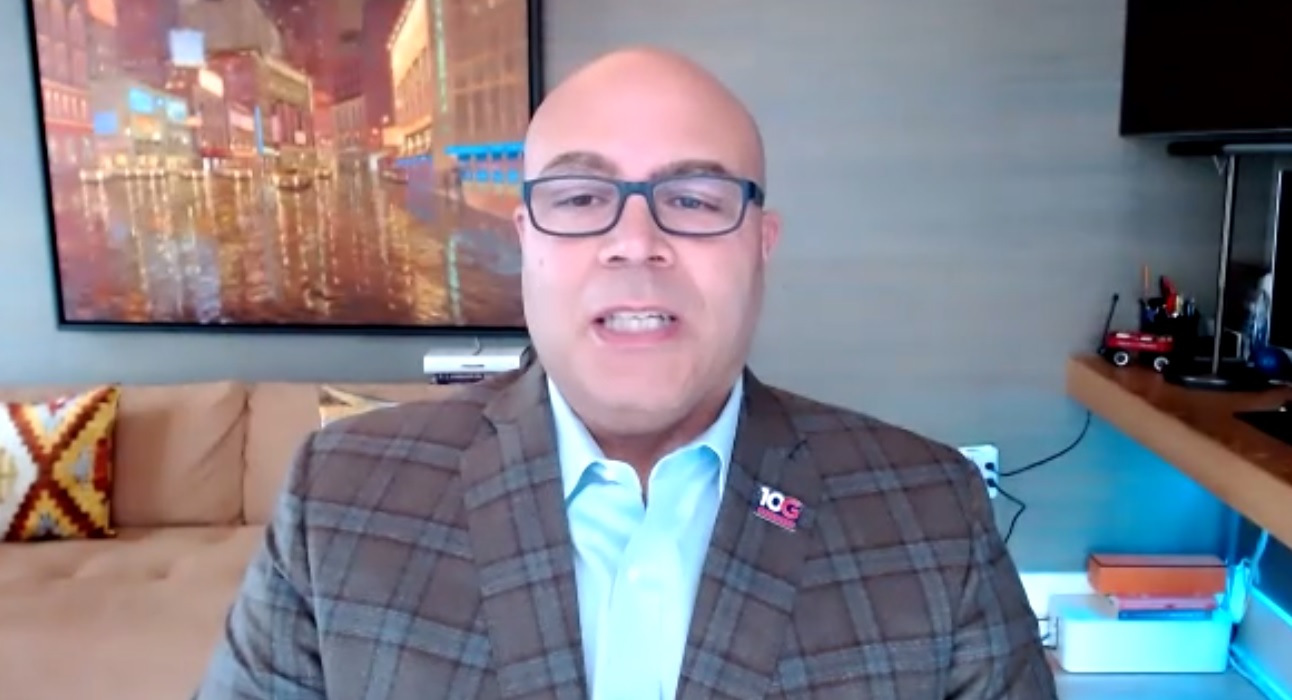Michael Powell Pitches FCC Unity
Said every entity has responsibility to help heal divisions

The smarter way to stay on top of the multichannel video marketplace. Sign up below.
You are now subscribed
Your newsletter sign-up was successful
Michael Powell, president of NCTA-the Internet & Television Association and former FCC chairman, is suggesting that a tied FCC--currently two Democrats and two Republicans--doesn't mean it should operate as though its hands were tied.
He is advising the commissioners to take that as an opportunity to build relationships for the tough work ahead, focusing on closing the political divide as it wades into the digital one.
Also Read: Jessica Rosenworcel Named Acting FCC Chairwoman
Powell was being interviewed at the virtual State of the Net conference by Clint Odom, SVP for policy and advocacy at the National Urban League and a former top FCC and Hill staffer, praised Powell's eloquence and then pressed him--there were PAC representatives on the Zoom call--on whether he would be running for the Senate. "I'm just a cable guy," Powell said, smiling.
Powell congratulated acting chair Jessica Rosenworcel, who he said he had once tried to hire when he was chairman, and said the 2-2 political tie was a "special moment of opportunity to build bipartisan relationships" without the pressure of a "clear, unflinching majority." He said it was an opportunity to recognize their mutual dependence and build and nurture bonds for tougher issues "down the line," like addressing broadband access to low income residents and students.
The former FCC chairman said it would be a mistake for the current FCC to sit back and not do anything until the Democrats had that "unflinching" majority, saying that would be the political response. Better, he said, to work harder to get things done together, which would be step toward a less politicized commission.
He said he regretted the trend in recent years toward that politicization, saying the FCC should wrap itself in its independence and be more more like jurists and less like "mini-politicians." Odom said he hoped the former chairman's advice would be heeded.
The smarter way to stay on top of the multichannel video marketplace. Sign up below.
Also Read: Congress Needs to Take Up Keep Americans Connected Pledge
Powell said that as a citizen and a human, he never felt more pain that in the summer months of protests over the killing of George Floyd. But he said what emerged was the sense that everyone, every institution, needed to be part of the solution.
He said the same lesson should come out of the Capitol insurrection, that everyone has a responsibility to diffuse the kind of vicious partisanship that took the country to where it is today. He said everyone, including at the FCC, can either contribute to the divisions or choose to doing it a different way, to look for common ground, not scorched earth, to stop demonizing or picking "shallow issues" that are not good policy because they appeal to a political base.
Powell also said that every person, every business, and every agency, needs to recognize their "universe of influence" both in the lack of progress toward overcoming systematic racism and in advancing that progress. Powell said President Biden had struck a beautiful tone in his inaugural remarks about unification. But he also cited poet Amanda Gorman, saying "the hill we climb is high."
That hill includes not only racial justice but broadband access, which Jesse Jackson, the late John Lewis have all said is THE civil rights issue of today.
Also Read: Pai Says He is Happy to Work with Congress to Help ISPs Recoup Pledge Costs
Powell said he recognized that his industry has an outsized role and responsibility in helping summit that hill.
In fact, he said when the country closed down last March, he talked to his CEOs about companies having social as well as business responsibilities to that goal, something he says they fully embrace, and told them, invoking Churchill, that this must be their "finest hour." But while they are central players, he says it would be a mistake to equate the importance of connectivity with utility if that means the onerous language that can go with it, a message to those who want to reclassify internet access as a common carrier.
Powell said he was proud of what the industry has done to help carry the country through, and says he thinks the industry will continue to do well by doing good.
Contributing editor John Eggerton has been an editor and/or writer on media regulation, legislation and policy for over four decades, including covering the FCC, FTC, Congress, the major media trade associations, and the federal courts. In addition to Multichannel News and Broadcasting + Cable, his work has appeared in Radio World, TV Technology, TV Fax, This Week in Consumer Electronics, Variety and the Encyclopedia Britannica.

